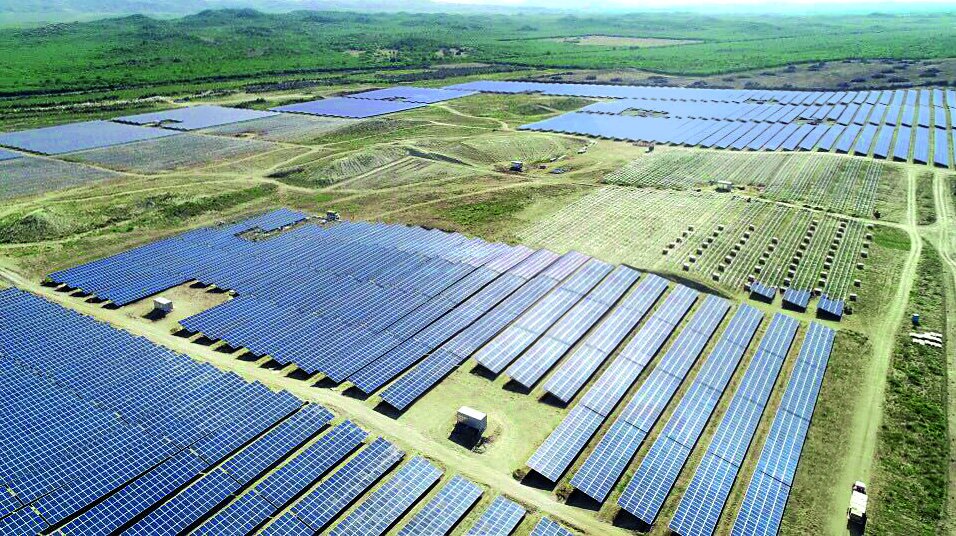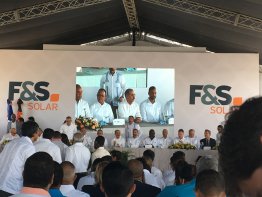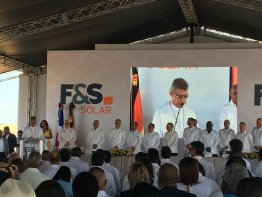Less Oil, More Sun: Largest PV Power Plant in the Caribbean Officially Opened

An area of two million square meters, 108,000 metric tons of CO2 saved each year and clean energy for more than 50,000 households: the Dominican Republic is now home to the largest PV power plant in the Caribbean. Besides President Danilo Medina Sanchez and other VIPs, Patrick Thomas from SMA was also a guest at the official opening. He believes that solar energy holds great opportunities for the country.

Important visitor: Numerous guests attended the official opening of the Caribbean’s largest PV farm with the President of the Dominican Republic, Danilo Medina Sanchez (centre of the picture), chief among them.
At present, more than half of the power for the Dominican Republic comes from oil-powered power plants. That is neither sustainable nor ecologically sensible. In addition, it means that the country is dependent on the price of oil. “With the increasing production of solar power, the country’s dependence on expensive oil imports falls and the environment benefits,” said a delighted Thomas. With its high irradiation values and countless hours of sun, the Dominican Republic is virtually predestined for solar energy generation. The quality of the transmission lines is also good, so there is no fear of limitations due to unstable grids.”
The energy from the PV farm is fed into the grid through a new electrical substation built specifically for the farm. In terms of power consumption, there is a Power Purchase Agreement (PPA) — a power supply contract stipulating that power will be supplied to the state utility company at a fixed price for the next 20 years. Incidentally, this price is already below the present market price for electricity today.
Second phase in preparation
There are already numerous small and sizeable PV systems in the country, which has a population of just over eleven million people. But the Montecristi PV farm is by far the largest project implemented there — with 58 MW of power. The company F&S Solar built the first phase of the two-part project within six months. The second phase of the PV farm is to be completed by 2019 and will be just as big as the first.

Patrick Thomas from SMA and Uwe Czypiorski, technical managing director of F&S Solar, in front of one of the 23 Medium-Voltage Power Stations at the Montecristi PV power plant.
Container solution for easy transportation and fast commissioning
In the remote region of Montecristi in the north-west of the country on the border with Haiti, a total of 23 2200SC Medium-Voltage Power Stations covering an area roughly the size of 280 football pitches have been used up to now. The turnkey containers, including Sunny Central inverters and tailored medium-voltage components, were delivered to the region located on the border with Haiti by boat and truck. One advantage of the container solution is that it can be quickly put into operation thanks to the perfectly coordinated components and is ready to use straight away.
German industry standard ensures safety
The PV power plant is situated in a valley surrounded by high mountains and is therefore well protected from the hurricanes that frequently occur in the Dominican Republic. Another advantage for reliable and safe solar power generation is monitoring at string level that F&S Solar also implemented in the Dominican Republic based on its experience with PV power plants in Germany. Since each individual string in the module field can be monitored, errors or failures can be discovered and their causes fixed much more quickly than with the otherwise widely used, conventional zone monitoring. Here, larger sections are monitored and, in the event of an error, a lot of time and effort must be given to identifying the precise cause (a defective string, etc.).
How the PV power plant is financed:
F&S Solar is not only the EPC contractor for the showcase project, but is also on board as an investor (35%). Hamburg-based Blue Elephant Energy AG (BEE) is investing the majority of the equity (65%). Debt financing was provided via European development banks, managed by DEG from Cologne, a wholly owned subsidiary of the KfW banking group. In addition, DEG checked and supervised the course of the entire project in accordance with ecological and social standards of the World Bank. With a total investment volume of USD 87 million, the project is among the leading German investments in the Caribbean.
Uwe Czypiorski, technical managing director at F&S Solar, said:
“The farm was gradually built up in blocks of 2.2 MW in line with the input power of the SMA inverter stations. ABB built the electrical substation. It’s very important to us to bring German partners on board with whom we maintain a long and trusting working relationship. This led to a special project being realized in the Dominican Republic with development expertise, high-quality components and financing from Germany.”


Great story, good news for our planet’s health; but continue this story by updating the final completion of this project. What is the estimated MW or GW, consumtion of electricity in the Dominican Republic?
“[…] According to OLADE, the Dominican Republic has around 3,000 MW of installed capacity for electricity generation. This generation capacity is mainly thermoelectric with 2,469.23 MW (82.5% of the installed total). It is important to note that there has been significant growth in installed capacity of plants using coal and natural gas in recent years. The rest is mostly made up of hydroelectric generation at about 525 MW. This capacity is used to generate about 15,000 GWh per year.[…]” Source